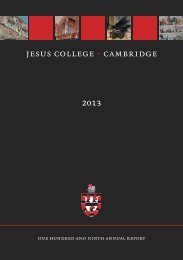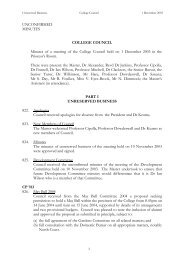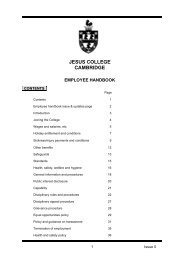2012 Annual Report - Jesus College - University of Cambridge
2012 Annual Report - Jesus College - University of Cambridge
2012 Annual Report - Jesus College - University of Cambridge
Create successful ePaper yourself
Turn your PDF publications into a flip-book with our unique Google optimized e-Paper software.
82 COLLEGE NEWS I <strong>Jesus</strong> <strong>College</strong> <strong>Annual</strong> <strong>Report</strong> <strong>2012</strong><br />
their sectors, (ii) Institutional Diversity, allowing the widest possible range <strong>of</strong><br />
opportunities for students and staff alike, and (iii) above all, a focus on Institutional<br />
Excellence, in teaching, learning, research and reflective enquiry, with this last<br />
endeavour best involving both independent study and collective engagement or<br />
collegiality.<br />
The meeting recognised, however, that such success faces major challenges,<br />
particularly given the continuing global economic environment which is restricting the<br />
financial support and investments that stakeholders can provide to the university<br />
system. The challenge <strong>of</strong> responding to this was a topic <strong>of</strong> much debate from which<br />
several points were identified during the meeting as being <strong>of</strong> importance:<br />
1. Institutional Focus: To deliver excellence and diversity across the UK university<br />
sector, and not least for the sake <strong>of</strong> students, institutions must focus on areas <strong>of</strong><br />
established excellence which have sufficient critical mass to be efficient. It was<br />
therefore proposed certain forms <strong>of</strong> education be focussed in specific centres, for<br />
example for the PhD degree. Also the Government should develop more specific<br />
metrics for recognising excellence, for example in vocational courses, so that all<br />
students in particular, could determine how well an institution would provide<br />
targeted training and education (and indeed to what extent they meet specific<br />
needs, standards and career opportunities). Entry standards should also be defined<br />
so it is clear what standards are required at school for the student to be sufficiently<br />
qualified to take the course.<br />
2. Global Focus: Research-Intensive universities can only be globally leading if they<br />
outperform international competitors. Despite its success, the UK cannot afford to<br />
be complacent in terms <strong>of</strong> the standing <strong>of</strong> its Research-intensive universities, not<br />
least because <strong>of</strong> the benefits this brings in terms <strong>of</strong> national reputation and<br />
recognition. Given the large levels <strong>of</strong> known future investment in research by<br />
Europe, success by UK Universities in obtaining a large proportion <strong>of</strong> such funding<br />
is crucial. To date, the UK Government has not needed to provide the support that<br />
other countries have implemented to help their universities achieve success in<br />
Europe, but this must be kept under review. UK universities must increasingly<br />
benchmark their standards at international levels, recognising that that the scale <strong>of</strong><br />
the university sector, for example the BRICs will dwarf Europe and the USA within<br />
twenty years, and the quality <strong>of</strong> leading universities elsewhere will be extremely<br />
high. Decisions on Government support for UK Research-Intensive universities<br />
need to take greater account <strong>of</strong> international competition and collaboration.<br />
3. Recognition <strong>of</strong> the Benefits <strong>of</strong> Research-Intensive Universities: It is only right that<br />
universities should accept scrutiny from stakeholders, not least in terms <strong>of</strong> value for<br />
money, and that this scrutiny typically involves a level <strong>of</strong> competition. Such scrutiny<br />
must also not only avoid detracting from the core functions <strong>of</strong> the sector, but rather<br />
reflect them. There was a strong view at the meeting, however, that current<br />
benchmarks for defining the social-economic benefits <strong>of</strong> universities need to be<br />
improved, and that the university sector needs to communicate more effectively its<br />
benefits, rather than primarily using comparative assessments at local levels such as<br />
in the REF. It was argued that although universities have been most successful in<br />
commercialising their research, the primary economic benefits from universities<br />
were from training students - the financial benefit <strong>of</strong> trained students is normally at<br />
least 100 times that <strong>of</strong> commercialisation activities. Also, this benefit arises from a<br />
very wide range <strong>of</strong> subjects, not least because many disciplines have common<br />
principles and levels <strong>of</strong> rigour. Impact is undoubtedly important, but should be on<br />
the basis <strong>of</strong> genuine academic achievement rather than coincidental circumstance













